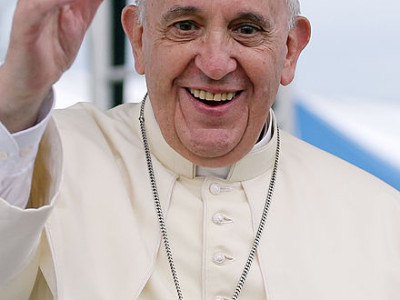Religion’s “Traditional” View: A Friendly Dissent
Faith Has Long Embraced Environmental Values
 Dan’s nice summary of Laudato Si will be the first of several commentaries on the page. But before we get going, I have to offer a friendly dissent on one aspect of it — an aspect that unfortunately plays into a lot of discussion of religion.
Dan’s nice summary of Laudato Si will be the first of several commentaries on the page. But before we get going, I have to offer a friendly dissent on one aspect of it — an aspect that unfortunately plays into a lot of discussion of religion.
Dan writes that Pope Francis’ encyclical seeks to re-read “the traditional assumption that God gave humans unfettered dominion.” But there is no such traditional assumption, as I have argued before on this page. Yes, there is language in Genesis 1 that can be read as giving humanity “dominion” over the earth. But not only was that challenged by the rabbis, who argued in a famous Midrash (Biblical exposition) that humanity can only “rule” over the earth if they preserve it and steward it, it is challenged by the alternative creation story found in Genesis 2. Verse 15 of that chapter reads, “The Lord God took the man and put him in the garden of Eden to till it and keep it.” Humanity’s rule is highly circumscribed from the very beginning.

This approach has deep roots in Catholic tradition. In particular, St. Francis of Assisi has long been regarded as the protector of the environment: in 1979, Pope John II proclaimed St. Francis as the “heavenly patron of those who promote ecology.” According to Jaroslav Pelikan’s masterful Jesus Through the Centuries: His Place in the History of Culture, this identification of Francis with nature and the environment pretty started shortly after the saint’s death. St. Francis’ “Canticle of the Creatures” sets forth his view pretty succinctly:
All praise be yours, My Lord,
through all that you have made.
And first my lord Brother Sun, who brings the day….How beautiful is he, how radiant in all his splendor!
Of you, Most High, he bears the likeness.All praise be yours, my Lord, through Sister Moon and Stars;
In the heavens you have made them, bright and precious and fair.All praise be yours, my Lord, through Brothers Wind and Air….
All praise be yours, my Lord, through Sister Water,
So useful, lowly, precious and pure.All praise be yours, my Lord, through Brother Fire,
through whom you brighten up the night….All praise be yours, my Lord, through Sister Earth, our mother,
Who feeds us…and produces various fruits
With colored flowers and herbs….Praise and bless my Lord, and give him thanks,
And serve him with great humility

Nevertheless, when Dan speaks of the “traditional view,” he is not alone. Why is this seen as the traditional view? There are two reasons, in my view.
In a widely-cited 1967 article, Lynn White Jr. theorized that Judeo-Christian religion has an inherently negative effect on environmental concern—environmental concern could only improve if Judeo-Christian religious institutions were rejected and if society converted to a “communion with nature” social structure. There was something to White’s thesis, and something against it. Yes, there were a lot of religious figures and institutions who used the verse in Genesis 1 to advocate for domination of nature, but there were many who, following Francis’ “Canticle of the Creatures,” came to the opposite conclusion. In other words, as with so much of religion, those looking to advance a particular viewpoint could find what they wanted to find in scriptures and tradition. In other words, there was no “traditional” view, but rather, as with all religious discourse, a vigorous debate. Which brings us to the second reason.
Religious authority — much like legal authority — often rests on the notion that it is not really authority at all, but really only repeating what everyone has known Since Time Immemorial. How many times have we seen the Supreme Court overrule decades if not centuries of precedent while blithely claiming that all it is doing is just restating well-known precedents? In the Old Testament, King Josiah and his faction effect a massive religious revolution — and do so claiming that they found an ancient scroll buried in the Temple that just so happens to give them exactly what they want. (2 Kings 22:8-20).

This pattern obviously dovetails well with conservatism’s reliance on tradition for authority. So it is unsurprising that religious conservatives should argue that religion promotes a Dominionist view of nature, and that all nature exists to serve humanity. But that doesn’t make it true: it just makes a particular ideology’s view of religion dominant. In this sense, progressives are no different: they (we!) will argue that religion is basically environmentalist. We all read our own values into religious text and tradition. It’s a big tradition: when something has been going on for 3,000 years, you can’t find whatever you want to, but you can find a lot. I might think that my reading is better than conservatives’, but I can’t deny that there are other readings, and intellectually honest conservatives should do the same.
We should not be misled by those who have used religious authority to argue for their values that their reading is the only one, or the “traditional” one. “The Torah has seventy faces,” reads an ancient rabbinic text (Bamidbar Rabbah 13:15, for those of you keeping score at home). That’s true whether you are Jewish or Catholic, or anything else.






Reader Comments